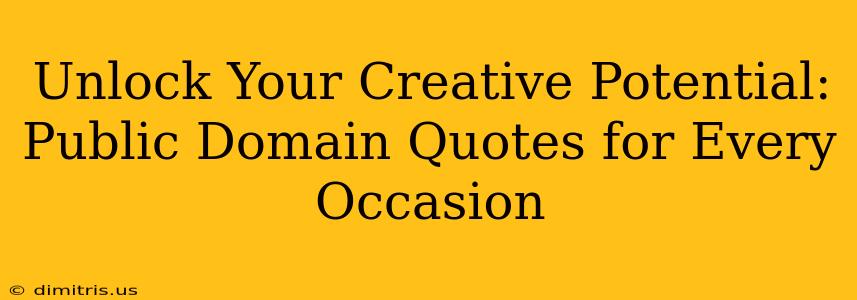Finding the perfect quote to inspire, motivate, or simply add a touch of elegance to your work can be challenging. Sifting through copyrighted material can be time-consuming and legally risky. Fortunately, a treasure trove of inspiring words awaits you in the public domain—a universe of quotes free for use, ripe for the picking, and ready to enhance your projects. This guide will explore the power of public domain quotes and how to leverage them for your creative endeavors.
Why Use Public Domain Quotes?
Public domain quotes are literary gold. They're words crafted by some of history's greatest minds, available for free use without fear of copyright infringement. This opens up a world of possibilities for writers, designers, educators, and anyone looking to add depth and impact to their work.
Benefits of using public domain quotes:
- Legally safe: No need to worry about permissions or licensing fees.
- Rich source of inspiration: Access to centuries of wisdom and wit.
- Adds credibility and sophistication: Using a well-known quote instantly elevates your content.
- Versatile applications: Suitable for various contexts, from presentations to social media posts.
Finding Public Domain Quotes: Where to Start Your Search?
Numerous resources exist to help you discover the perfect public domain quote. Here are some excellent starting points:
- Project Gutenberg: A massive online library of public domain books and texts, including countless quotable passages.
- Bartleby.com: Another valuable resource featuring classic literature and famous quotes.
- Quote websites with public domain filters: Several quote websites allow you to filter results by copyright status, ensuring you only see public domain options. (Always double-check the copyright status, just to be sure).
- Academic databases: While not solely dedicated to quotes, academic databases often contain digitized versions of public domain texts, rich in quotable material.
How to Properly Attribute Public Domain Quotes
Even though they are in the public domain, ethical considerations demand proper attribution. This not only demonstrates respect for the original author but also adds credibility to your work. A simple citation usually suffices. For example:
-
"The only way to do great work is to love what you do." – Steve Jobs (While this is a famous quote and often attributed to Jobs, it's important to note that verification is difficult, and it may not be fully accurate.) If using this quote, include the source you found it from, as it is widely debated as to its true origin.
-
"To be or not to be, that is the question." – William Shakespeare, Hamlet
Remember to always cite the source where you found the quote, even if the quote itself is in the public domain.
What Types of Creative Projects Benefit from Public Domain Quotes?
The applications of public domain quotes are remarkably diverse. Consider these examples:
- Blog posts and articles: Use quotes to support your arguments, add a touch of personality, or break up large blocks of text.
- Social media posts: A well-chosen quote can spark engagement and enhance your brand’s voice.
- Presentations and speeches: Quotes can add weight to your points and create a memorable impact on your audience.
- Graphic design: Quotes can be visually integrated into posters, cards, or website banners.
- Creative writing: Use quotes as inspiration or as a springboard for your own stories.
How to Choose the Right Public Domain Quote for Your Needs
Selecting the perfect quote involves understanding the context and your objectives:
- Relevance: Ensure the quote directly relates to your topic or theme.
- Tone: Choose a quote that aligns with the overall tone of your project.
- Audience: Consider your target audience when selecting a quote. A quote that resonates with one group may not be suitable for another.
- Brevity: Shorter quotes are often more impactful and easier to incorporate.
Frequently Asked Questions (FAQ)
Are all quotes from deceased authors in the public domain?
No. Copyright laws vary depending on the country and the date of the author's death. Just because an author is deceased doesn't automatically mean their work is in the public domain. Always verify copyright status before using a quote.
Can I modify a public domain quote?
Generally, yes. You can adapt or paraphrase a public domain quote, but be mindful of maintaining the original meaning and intent. Overly significant alterations might be considered a derivative work, requiring its own copyright considerations.
What if I can't find the original source of a quote?
If you can't verify the original source, it's best to err on the side of caution and avoid using the quote altogether.
Unlocking your creative potential with public domain quotes is a simple yet powerful strategy. By carefully selecting and properly attributing these timeless words, you can add depth, impact, and legal security to your work. Remember to always double-check copyright before using any quote, even those you believe to be in the public domain. Happy quoting!

